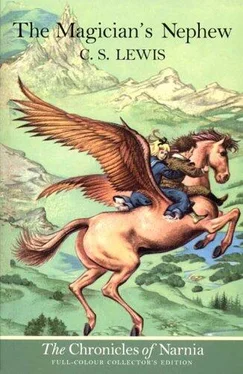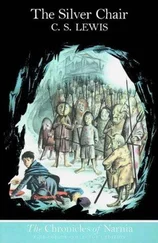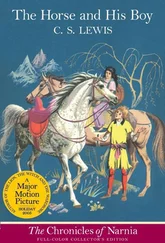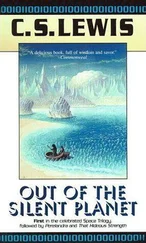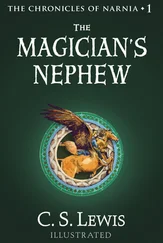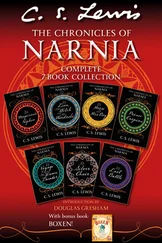Clive Lewis - The Magician’s Nephew
Здесь есть возможность читать онлайн «Clive Lewis - The Magician’s Nephew» — ознакомительный отрывок электронной книги совершенно бесплатно, а после прочтения отрывка купить полную версию. В некоторых случаях можно слушать аудио, скачать через торрент в формате fb2 и присутствует краткое содержание. Жанр: Сказка, на английском языке. Описание произведения, (предисловие) а так же отзывы посетителей доступны на портале библиотеки ЛибКат.
- Название:The Magician’s Nephew
- Автор:
- Жанр:
- Год:неизвестен
- ISBN:нет данных
- Рейтинг книги:3 / 5. Голосов: 1
-
Избранное:Добавить в избранное
- Отзывы:
-
Ваша оценка:
- 60
- 1
- 2
- 3
- 4
- 5
The Magician’s Nephew: краткое содержание, описание и аннотация
Предлагаем к чтению аннотацию, описание, краткое содержание или предисловие (зависит от того, что написал сам автор книги «The Magician’s Nephew»). Если вы не нашли необходимую информацию о книге — напишите в комментариях, мы постараемся отыскать её.
English years: 1900
Narnian years: 1
The Magician’s Nephew — читать онлайн ознакомительный отрывок
Ниже представлен текст книги, разбитый по страницам. Система сохранения места последней прочитанной страницы, позволяет с удобством читать онлайн бесплатно книгу «The Magician’s Nephew», без необходимости каждый раз заново искать на чём Вы остановились. Поставьте закладку, и сможете в любой момент перейти на страницу, на которой закончили чтение.
Интервал:
Закладка:
But Digory was more interested in the faces, and indeed these were well worth looking at. The people sat in their stone chairs on each side of the room and the floor was left free down the middle. You could walk down and look at the faces in turn.
“They were nice people, I think,” said Digory.
Polly nodded. All the faces they could see were certainly nice. Both the men and women looked kind and wise, and they seemed to come of a handsome race. But after the children had gone a few steps down the room they came to faces that looked a little different. These were very solemn faces. You felt you would have to mind your P’s and Q’s, if you ever met living people who looked like that. When they had gone a little further, they found themselves among faces they didn’t like: this was about the middle of the room. The faces here looked very strong and proud and happy, but they looked cruel. A little further on they looked crueller. Further on again, they were still cruel but they no longer looked happy. They were even despairing faces: as if the people they belonged to had done dreadful things and also suffered dreadful things. The last figure of all was the most interesting—a woman even more richly dressed than the others, very tall (but every figure in that room was taller than the people of our world), with a look of such fierceness and pride that it took your breath away. Yet she was beautiful too. Years afterwards when he was an old man, Digory said he had never in all his life known a woman so beautiful. It is only fair to add that Polly always said she couldn’t see anything specially beautiful about her.
This woman, as I said, was the last: but there were plenty of empty chairs beyond her, as if the room had been intended for a much larger collection of images.
“I do wish we knew the story that’s behind all this,” said Digory. “Let’s go back and look at that table sort of thing in the middle of the room.”
The thing in the middle of the room was not exactly a table. It was a square pillar about four feet high and on it there rose a little golden arch from which there hung a little golden bell; and beside this there lay a little golden hammer to hit the bell with.
“I wonder… I wonder… I wonder…” said Digory.
“There seems to be something written here,” said Polly, stooping down and looking at the side of the pillar.
“By gum, so there is,” said Digory. “But of course we shan’t be able to read it.”
“Shan’t we? I’m not so sure,” said Polly.
They both looked at it hard and, as you might have expected, the letters cut in the stone were strange. But now a great wonder happened: for, as they looked, though the shape of the strange letters never altered, they found that they could understand them. If only Digory had remembered what he himself had said a few minutes ago, that this was an enchanted room, he might have guessed that the enchantment was beginning to work. But he was too wild with curiosity to think about that. He was longing more and more to know what was written on the pillar. And very soon they both knew. What it said was something like this—at least this is the sense of it though the poetry, when you read it there, was better:
Make your choice, adventurous Stranger;
Strike the bell and bide the danger,
Or wonder, till it drives you mad,
What would have followed if you had.
“No fear!” said Polly. “We don’t want any danger.”
“Oh but don’t you see it’s no good!” said Digory. “We can’t get out of it now. We shall always be wondering what else would have happened if we had struck the bell. I’m not going home to be driven mad by always thinking of that. No fear!”
“Don’t be so silly,” said Polly. “As if anyone would! What does it matter what would have happened?”
“I expect anyone who’s come as far as this is bound to go on wondering till it sends him dotty. That’s the Magic of it, you see. I can feel it beginning to work on me already.”
“Well I don’t,” said Polly crossly. “And I don’t believe you do either. You’re just putting it on.”
“That’s all you know,” said Digory. “It’s because you’re a girl. Girls never want to know anything but gossip and rot about people getting engaged.”
“You looked exactly like your Uncle when you said that,” said Polly.
“Why can’t you keep to the point?” said Digory. “What we’re talking about is—”
“How exactly like a man!” said Polly in a very grownup voice; but she added hastily, in her real voice, “And don’t say I’m just like a woman, or you’ll be a beastly copy-cat.”
“I should never dream of calling a kid like you a woman,” said Digory loftily.
“Oh, I’m a kid, am I?” said Polly who was now in a real rage. “Well you needn’t be bothered by having a kid with you any longer then. I’m off. I’ve had enough of this place. And I’ve had enough of you too—you beastly, stuck-up, obstinate pig!”
“None of that!” said Digory in a voice even nastier than he meant it to be; for he saw Polly’s hand moving to her pocket to get hold of her yellow ring. I can’t excuse what he did next except by saying that he was very sorry for it afterwards (and so were a good many other people). Before Polly’s hand reached her pocket, he grabbed her wrist, leaning across with his back against her chest. Then, keeping her other arm out of the way with his other elbow, he leaned forward, picked up the hammer, and struck the golden bell a light, smart tap. Then he let her go and they fell apart staring at each other and breathing hard. Polly was just beginning to cry, not with fear, and not even because he had hurt her wrist quite badly, but with furious anger. Within two seconds, however, they had something to think about that drove their own quarrels quite out of their minds.
As soon as the bell was struck it gave out a note, a sweet note such as you might have expected, and not very loud. But instead of dying away again, it went on; and as it went on it grew louder. Before a minute had passed it was twice as loud as it had been to begin with. It was soon so loud that if the children had tried to speak (but they weren’t thinking of speaking now—they were just standing with their mouths open) they would not have heard one another. Very soon it was so loud that they could not have heard one another even by shouting. And still it grew: all on one note, a continuous sweet sound, though the sweetness had something horrible about it, till all the air in that great room was throbbing with it and they could feel the stone floor trembling under their feet. Then at last it began to be mixed with another sound, a vague, disastrous noise which sounded first like the roar of a distant train, and then like the crash of a falling tree. They heard something like great weights falling. Finally, with a sudden, rush and thunder, and a shake that nearly flung them off their feet, about a quarter of the roof at one end of the room fell in, great blocks of masonry fell all round them, and the walls rocked. The noise of the bell stopped. The clouds of dust cleared away. Everything became quiet again.
It was never found out whether the fall of the roof was due to Magic or whether that unbearably loud sound from the bell just happened to strike the note which was more than those crumbling walls could stand.
“There! I hope you’re satisfied now,” panted Polly.
“Well, it’s all over, anyway,” said Digory.
And both thought it was; but they had never been more mistaken in their lives.
CHAPTER FIVE.
THE DEPLORABLE WORD
THE children were facing one another across the pillar where the bell hung, still trembling, though it no longer gave out any note. Suddenly they heard a soft noise from the end of the room which was still undamaged. They turned quick as lightning to see what it was. One of the robed figures, the furthest-off one of all, the woman whom Digory thought so beautiful, was rising from its chair. When she stood up they realized that she was even taller than they had thought. And you could see at once, not only from her crown and robes, but from the flash of her eyes and the curve of her lips, that she was a great queen. She looked round the room and saw the damage and saw the children, but you could not guess from her face what she thought of either or whether she was surprised. She came forward with long, swift strides.
Читать дальшеИнтервал:
Закладка:
Похожие книги на «The Magician’s Nephew»
Представляем Вашему вниманию похожие книги на «The Magician’s Nephew» списком для выбора. Мы отобрали схожую по названию и смыслу литературу в надежде предоставить читателям больше вариантов отыскать новые, интересные, ещё непрочитанные произведения.
Обсуждение, отзывы о книге «The Magician’s Nephew» и просто собственные мнения читателей. Оставьте ваши комментарии, напишите, что Вы думаете о произведении, его смысле или главных героях. Укажите что конкретно понравилось, а что нет, и почему Вы так считаете.
